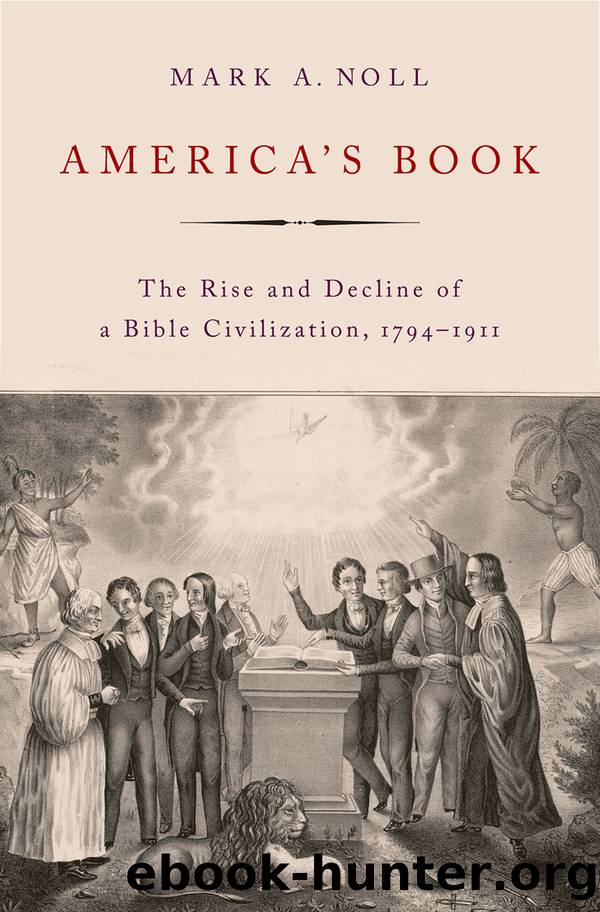America's Book by Mark A. Noll

Author:Mark A. Noll
Language: eng
Format: epub
Publisher: Oxford University Press
Published: 2022-01-15T00:00:00+00:00
In the phantom court of objectivity, his case many not have been airtight, but it was pretty good.
20
Scriptural Arguments in Context
The first casualty of the exegetical war before the shooting war was the exegeted object itself, the Scriptures. The antebellum interpretive controversies over slavery and race affected the American history of the Bible more decisively than any other development or set of circumstances before or since. For public discourse, literature, publishing, and many levels of education, Scripture would of course remain important in American history long after the Union armies subjugated the breakaway slave republic that so many white Bible believers had so ardently supported. As a source of individual and communal spiritual inspiration, encouragement, and guidance, the Bible also never faded away. Yet in E. Brooks Holifieldâs definitive assessment, âthe theological impasse [over the Bible and slavery] meant that theology could no longer articulate the moral vision that held the culture together.â1 As earlier chapters have detailed, the ideal of a Bible-centered national moral vision had already come under irreversible pressure from internal Protestant disagreements and the rapidly increasing population of non-Protestants. Creative religious movements exploiting the possibilities of democratic freedom and the separation of church and state were likewise undercutting the ideal of Bible-based national moral unity. Yet the division over racial slavery was different because it featured not claims about alternative religious authorities but conflict among those who professed to believe the same truths from the same Book interpreted in the same way.
In broader perspective, it is of course too simple to think that contentions over biblical interpretation dominated the great national divide that led to the Civil War. In much recent historiography, slavery appears as an economic-cultural juggernaut driving every national development of any significance whatsoever.2 A more generally humanistic mobilization for abolition that relied only incidentally on Scripture had also existed since early in the republic.3 The Bible played only a supporting role as elite white intellectual life diverged North and South.4 Some Black Americans, like Robert Alexander Young in his Ethiopian Manifesto from 1829, stressed Afro-centered natural rights more than explicit biblical mandates.5 When the Republican Party finally emerged, broad moral, economic, and political interests defined its efforts against âthe slave powerâ rather than anything specifically biblical.6 Still, the inability of biblical antislavery arguments to convince the nationâs white population, among whom the Protestant Scriptures enjoyed unmatched respect and where the Bible had played such a large part in creating the national civilization, contributed significantly to the national story.
Just as important, but from another angle of assessment, antebellum biblical arguments over slavery decisively influenced the history of the Bible after the war. For a clearer sense of complex historical developments, a pause for reflection on two related questions is appropriate: Why were biblical proslavery arguments so persuasive in the antebellum United States, but only the United States? And how did the relative success of those arguments affect the history of Scripture long after the Civil War was over?
Download
This site does not store any files on its server. We only index and link to content provided by other sites. Please contact the content providers to delete copyright contents if any and email us, we'll remove relevant links or contents immediately.
| Exegesis & Hermeneutics | New Testament |
| Old Testament |
The Five People You Meet in Heaven by Mitch Albom(3547)
The Secret Power of Speaking God's Word by Joyce Meyer(3148)
Real Sex by Lauren F. Winner(3000)
Name Book, The: Over 10,000 Names--Their Meanings, Origins, and Spiritual Significance by Astoria Dorothy(2966)
The Holy Spirit by Billy Graham(2933)
0041152001443424520 .pdf by Unknown(2838)
How The Mind Works by Steven Pinker(2808)
ESV Study Bible by Crossway(2768)
Ancient Worlds by Michael Scott(2663)
Churchill by Paul Johnson(2570)
The Meaning of the Library by unknow(2554)
The ESV Study Bible by Crossway Bibles(2543)
The Gnostic Gospels by Pagels Elaine(2515)
MOSES THE EGYPTIAN by Jan Assmann(2408)
Jesus by Paul Johnson(2347)
City of Stairs by Robert Jackson Bennett(2337)
The Complete Dead Sea Scrolls in English (7th Edition) (Penguin Classics) by Geza Vermes(2269)
The Nativity by Geza Vermes(2219)
Ancient Near Eastern Thought and the Old Testament by John H. Walton(2213)
